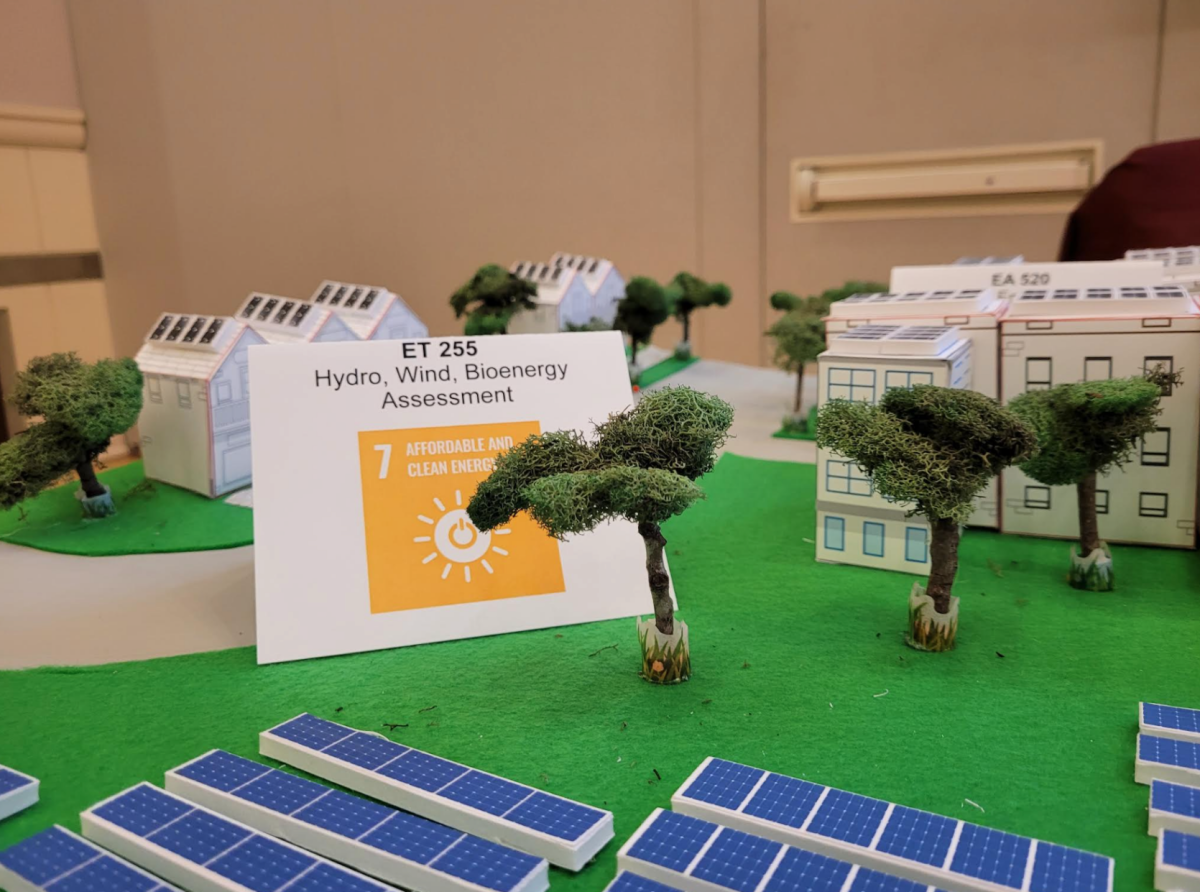The Sustainability Office and Office of Global Engagement hosted their second annual Sustainable Development Goals Expo on Tuesday, March 21 with the purpose of exposing students to classes that align with the United Nations’ 17 goals of sustainable development ahead of fall 2023 course registration.
Jessica Bast, a program coordinator in the Sustainability Office and a coordinator of the event, said one of her responsibilities is to match undergraduate and graduate courses with each of the UN’s sustainable development goals.
Lyra Dumdum, a lecturer in renewable energy development, represented the graduate certificate in renewable energy assessment and development, its required courses and the undergraduate courses, ET 262 Renewable Energy Adoption: Barriers and Incentives and ET 255: Hydro, Wind, Bioenergy Assessment. Dumdum said the graduate certificate teaches students how to best introduce renewable energy developments in urban societies.
“The purpose of the graduate certificate renewable energy is basically to figure out where are the best places to develop renewable energy so that it has the least impact to society and to the environment with the most impact to society and to make it financially sustainable,” Dumdum said. “We look through different renewable energy sources, not just solar, and see what your best options are. We also take into consideration policy, because policy right now really drives the economics of renewable energy development.”
Perry Peralta, associate professor in sustainable materials technology, represented SMT 200: Introduction to Sustainable Materials and Technology and SMT 207/217: Introduction to Sustainable Product Development Lecture and Lab. Peralta said Americans consume 25,000 pounds of materials each year, which is eight times the world average. While sustainable alternatives are already available, Peralta said they are too expensive to become realistic alternatives. He said his class studies ways to produce more sustainable and economically viable alternatives.
Kathryn Stevenson, associate professor in parks, recreation and tourism management, hosted a table for the undergraduate environmental education minor. Its required courses are EMS 350: Teaching Environmental Education (Fall) and PRT 485: Environmental Education in Practice (Spring.) Stevenson said the environmental education minor has attracted students of all majors and aims to prepare students to apply environmental relations to all facets of life.
“Everybody needs to understand [the environment], people need to know how to communicate it, and that’s sort of like a basic human need and right, then equity has to be in everything we do,” Stevenson said. “Sustainable Cities is a really big one right now, because it’s an urbanizing world. As we see less and less green space, environmental education has a real place in that.”
Angela Allen, director of environmental technology and management, and Solomon Ghezehei, associate professor in forestry and environmental resources, represented both levels of Environmental Technology Laboratory, ET 201 and ET 202. Allen said both courses are hands-on and give students the opportunity to do fieldwork, mainly through monitoring and testing water samples.
Ghezehei said the courses offer sustainable and natural approaches to water management, such as the introduction of plant species.
“[We are] using plants to remediate the environment,” Ghezehei said. “Establishing the ecosystem and the plants and keeping them sustainable not only for the functioning [of the environment], but also to help with the soil and the ecosystem.”
Ayse Ercumen, assistant professor in forestry and environmental resources, is offering CE 495/596: Research Methods for Global Environmental Health, ES 495: Water Quality and Health, Research Methods for Global Environmental Health ES/CE 472 and ES/CE 572 to students of graduate or junior standing. Ercumen said her courses focus heavily on water quality and examining contaminants, highlighting the importance of water quality to the rest of sustainability, as a whole.
“It really links up to more than just health,” Ercumen said. “Poverty, hunger, everything food security, all the things that are very related to water quality, but more immediately, water quality is sort of the linkage between these forces.”
The Inter-Faith Food Shuttle held a table at the Expo. Susan Meador, volunteer services director, said the Food Shuttle is a non-profit that recovers and distributes food to low-income people in the seven counties they operate. Meador said the organization’s work goes beyond distributing food.
“What makes us unique is that we really try to pinpoint our responses to the community need,” Meador said. “We kind of categorized that in feeding our neighbors, teaching self-sufficiency, growing healthy foods, and cultivating innovative approaches to end hunger. In anything we’re doing, we’re not just about handing over a box of food or teaching a lesson, we’re really trying to get at the root cause of hunger and building relationships.”
Melvin Acosta, vice president of operations and logistics, said sustainability is at the core of the non-profit, as the organization recovers food from retail stores and distributes them among the community, while putting sustainable practices in mind by optimizing things such as delivery routes. Acosta said the Interfaith Food Shuttle redistributed over 10 million pounds of food last year.
Acosta said anyone is welcome to volunteer with the organization through a wealth of different avenues. More information on volunteering can be found here.













